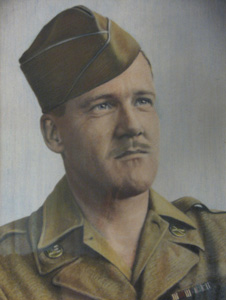“THIS THE TIME”
War Poems by Harold Olov Wang
FOREWORD
THE SOLDIER LOOKS BACK…AND AHEAD
 Hardly back from the war, and in but a few years seeing the war’s high purpose toward the ends of peace slipping through fingers of renewed greed and lust for power throughout the world, the Soldier felt it time memories were refreshed.
Hardly back from the war, and in but a few years seeing the war’s high purpose toward the ends of peace slipping through fingers of renewed greed and lust for power throughout the world, the Soldier felt it time memories were refreshed.
He felt there was a need for recapturing the feeling of those moments of World War II when men fought, suffered and died so that the better way of life might triumph over the destructive forces of totalitarianism conniving to take over the word.
Analyzing the world which he had seen pass through the greatest test of its moral strength, a test in which he, as a soldier, had been actively involved, the Soldier thought the sacrifice of his former brothers in arms, as well as the countless civilians who were the innocent victims of the struggle, were deserving of far more remembrance and respect than the present state of the world would indicate.
Thus the Soldier dug into a worn briefcase and brought forth these poems written during the war, so that the mindmood of those years might be recalled, so that the urgent need of cooperation among men might again become as apparent as it was then.
The Soldier thought these poems had something to say to the people of the world, and to the men who determine the future – whether good or evil – for them. He thought all people individually and collectively throughout the world should not forget the actual feeling of what the war had been, and what war is – in sacrifice, moral depletion, economic chaos, and life itself – what is at stake when peoples, basically akin to each other, allowing the cunning and ruthlessness of power-hungry “leaders” to send them hurtling down the road to war again.
The poems, the Soldier wanted it felt, were not merely the voice of one man looking through hurt and troubled eyes, but they represented the feelings of all those who face war, from the cry of the wounded soldier on the battlefield to the cry of the mother releasing her son to unknown dangers on that battlefield.
The Soldier felt that in the universal recollection of the war-time suffering lay one of the strongest pleas for peace. Yet even as he thought upon these very soldiers who had provided the world with at least the setting for a peace that should have come, he realized that the fundamental freedoms and human rights, which mankind had gained in its long progress toward an ever higher civilization, could not endure under a peace where liberty is constantly threatened, and so the Soldier could only hope, even as he wondered.
Copyright 1948